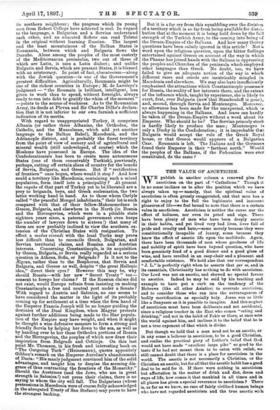T HE loyalty of the European Turks to the Ruler of
the fragment of the Balkan Peninsula still left to the Ottoman Empire is strained as it has never been before. The Ethnikc Hetairia's bands are calling "the children" to arms in Macedonia. Bulgaria is said to be uniting with Servia and Montenegro—whose Princes are already members of the Panslavist League—in a minor Triple Alliance. Is it any wonder that visions of a new Empire of the Balkans are again floating through the minds of politicians with imagination and an inclination towards " long views " ? Surely, one hears it said, the year 1900 will see set up that Balkan Confederation concerning which so much has been written ? A century later, with the beginning of the second thousand years of the Christian era, may not the Dream-Empire of the Balkans itself be ushered in in " the garden of the world made desolate " by four centuries of Ottoman oppression ? Certainly the Imperial idea is not dead in the Peninsula. Every evening, under the shadow of an old willow in Constantinople, a lamp is lit over the uncut stone which marks the tomb of the heroic Constantine, the last Emperor of the Greeks. To the Serbs the name of their Czar Dushan, who, exactly five hundred years before our Queen came to the throne, subjugated Macedonia and Albania, is as familiar as that of the Bruce to the Scots peasant. Prince Ferdinand of Bulgaria in calling his infant boy Boris paid a tribute to the influence still exerted over his people by the traditions of the ninth century, in which the " Emperor of the Bulgarians and Despot of the Greeks " occupied the suburbs of Constan- tinople and reigned over the whole country. Turning to tiny Montenegro, need one do more than mention the name of Prince Nicholas's drama, The Empress of the Balkans ? As to the Roumanians, who that is acquainted with the speeches and articles of the politicians and jour- nalists of Bucharest will deny that the Emperor Trajan is a name to conjure with ?
" This federation of free States, destined to fill the gap that will be caused by the dissolution of the Ottoman Empire," wrote Lamartine sixty years ago. The Turks might never have gained their footing in Europe had Serbs, Bulgarians, and Greeks stood shoulder to shoulder in the Middle Ages. Can they be trusted to act together when their next great chance comes ? The realisation of the Dream-Empire depends less upon the disposition of Russia and Austria than upon the temper and strength of the emancipated peoples themselves. With regard to Greece, the world has had an excellent opportunity of late of judging not only the national character but the military, naval, and economic resources of the State. Servia, the only Balkan principality without a seaport, is smaller even than Greece (area, five thousand square miles less than that of Scotland), but lords it in point of area over the Serb Montenegro, which is but half the size of Wales. In spite of heavy taxes Servia is in straits for money. Although possessing, like the brave high- landers of the Black Mountain, a native ruler, the country has found its monarchy burdensome in more ways than one. Great politicians and newspaper readers, the fidgety Servians fail to impress their visitors as favourably as the Bulgarians. As to the Servian Army, it has hardly lived down the memory of its humiliating defeat at the hands of Prince Alexander. Bulgaria (area, that of Scotland and Wales), which shares with Roumania and what remains of Turkey in Europe the Black Sea front, has always had friends in this country, and its affairs are well known. It is much less given to show than its northern neighbour ; the progress which its young men from Robert College have achieved is real. In regard to the language, a Bulgarian and a Servian understand each other, and an educated Sofiote can read Tolstoi in the original without learning Russian. The largest and the least mountainous of the Balkan States is Roumania, between which and Bulgaria flows the Danube. Alone among the peoples of the most easterly of the Mediterranean peninsulas, two out of three of which are Latin, it uses a Latin dialect ; and unlike Bulgaria and Servia, which are peasant States, it is blessed with an aristocracy. In point of fact, absenteeism—along with the Jewish question—is one of the Government's greatest difficulties. Agriculturally, Roumania might be one of the richest countries in Europe ; M. de Laveleye's judgment — " the Roumain is brilliant, intelligent, less given to work than to spend, without foresight, always ready to run into debt to gratify the whim of the moment " —points to the source of weakness. As to the Roumanian Army, its deeds at Plevna and Sir Charles Dilke's declara- tion that it is not inferior to our own furnish a sufficient indication of its merits.
With regard to unappropriated Turkey, it comprises Albania (or rather three Albanias, the Orthodox, the Catholic, and the Mussulman, which add yet another language to the Balkan Babel), Macedonia, and the Adrianople district, and is probably the finest territory from the point of view of scenery and of agricultural and mineral wealth (still undeveloped, of course) which the Moslems have possessed in Europe. The idea of the Confederationists has been to create more autonomous States (one of them conceivably Turkish), previously, perhaps, cutting off certain slices of country for the benefit of Servia, Bulgaria, and Greece. But if " rectification of frontiers" once began, where would it stop ? And how could a territory like Macedonia, containing such a mixed population, form itself into a principality ? At present the rayahs of that part of Turkey yet to be liberated are a prey to brigands, beys, and Greek ecclesiastics, the two latter working hand in hand. As to those whom Carlyle called " the peaceful Mongol inhabitants," their lot is such compared with that of their fellow-Mahommedans in Greece, Bulgaria, and elsewhere in the North (in Bosnia and the Herzegovina, which were in a pitiable state eighteen years since, a paternal government even keeps the number of lawyers down to sixteen !) that many of them are now probably inclined to view the southern ex- tension of the Christian States with resignation. To effect a modus vivendi with the local Turks may prove less difficult than to reconcile Greek, Bulgarian, and Servian territorial claims, and Russian and Austrian interests. Concerning Constantinople, is its acquisition by Greece, Bulgaria, or Servia really regarded as a serious question in Athens, Sofia, or Belgrade ? Is it not to the lEgean, rather than to the Bosphorus, that Servia and Bulgaria, and Greece as well, despite " the great Hellenic idea," direct their eyes ? However this may be, why should Russia—with her new " Secret Treaty " too— consent to forego her claims ? If the Russian claims did not exist, would Europe refrain from insisting on making Constantinople a free and neutral port under a Senate ? With regard to Austria and Salonica, no one seems to have considered the matter in the light of its probably coming up for settlement at a time when the firm hand of the Emperor Francis Joseph will be no longer guiding the destinies of the Dual Kingdom, when Magyar protests against further additions being made to the Slav popula- tion of the Empire may have weight, and when it might be thought a wise defensive measure to form a strong and friendly Servia by helping her down to the sea, as well as by handing over to her those Orthodox portions of Bosnia and the Herzegovina, the peoples of which now draw their inspiration from Belgrade and Cettinje. On this last point Mr. Thomson, in his fresh and interesting book on "The Outgoing Turk" (Heinemann), quotes appositely Gibbon's remark on the Emperor Aurelian's abandonment of Dacia: "His manly judgment convinced him of the solid advantages, and taught him to despise the seeming dis- grace of thus contracting the frontiers of the Monarchy." Should the Austrians (and the Jews, who are in great strength in Salonica!) not press their claims, there is no saying to whom the city will fall. The Bulgarians (whose pretensions in Macedonia were of course fully acknowledged in the abrogated Treaty of San Stefano) may prove to have the strongest backing.. But it is a far cry from this squabbling over the division of a territory which is so far from being available for distri- bution that at the moment it is being held down by the full strength of the Turkish Armv, to the coming into being of the Dream-Empire of the Balkans. And how many thorny questions have been calmly ignored in this article ! Not a. word upon the religious question, upon the bitter feelings entertained against Greece on account of the way in which the Phanar has joined hands with the Sultans in oppressing- the peoples and Churches of the peninsula which employed other languages than Greek. No doubt, too, we have failed to give an adequate notion of the way in which different races and creeds are inextricably mingled in Macedonia and elsewhere. We may also have insufficiently emphasised the attractions which Constantinople possesses for Russia, the reality of her interests there, and the extent of the influence which, taught by experience, sbe is likely to exert, first, over Bulgaria (now that Stambouloff is gone), and, second, through Servia and Montenegro. Moreover, no allowance has been made for the unexpected, which is always happening in the Balkans. And leave can hardly be taken of the Dream-Empire without a word about its Emperor. Who should he be? The Servian princely stock is hardly likely to produce the man ; Montenegro is only a Duchy in the Confederation ; it is improbable that Bulgaria would accept the rule of the Greek Royal house, or that Greece would approve of a Bulgarian Czar. Roumania is left. The Italians and the Germans found their Emperor in their " farthest north." Would the peoples of the Balkans, if the Federation were ever constituted, do the same ?



































 Previous page
Previous page